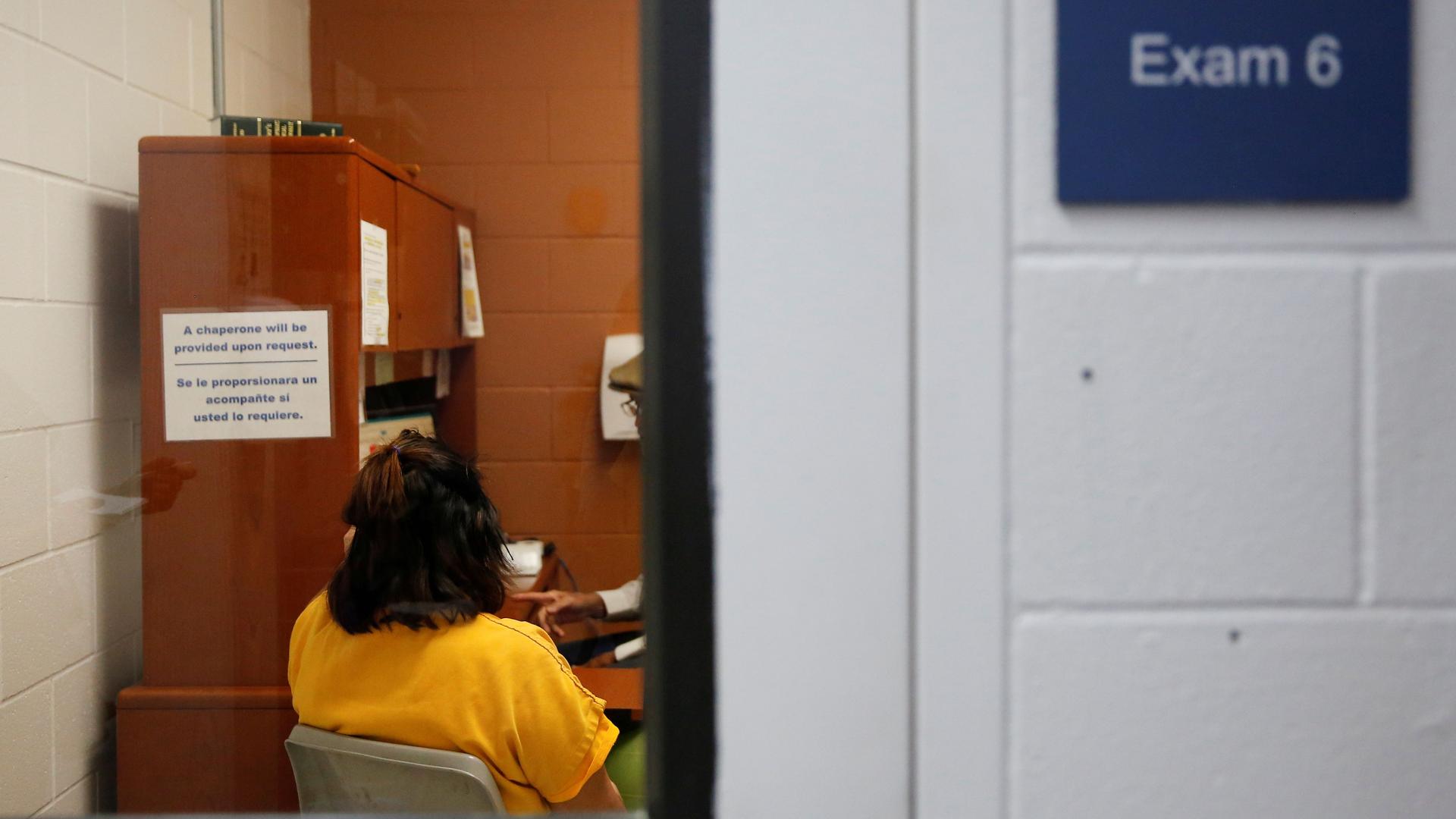As the coronavirus has crept across the globe, immigrants in US detention facilities have listened closely to surreal tales of disease-ridden cruise ships and sold-out grocery stores.
Tens of thousands of immigrants are currently detained by Immigration and Customs Enforcement (ICE), and activists have been warning for weeks that an outbreak of the coronavirus in detention facilities could be disastrous.
Then, on Tuesday, ICE recorded its first case of COVID-19 in a detainee — an immigrant in a detention center in New Jersey.
Related: ‘Emergency releases’ from prison reduce risk of virus spread, criminal justice expert says
“We’re in a really bad situation, and we are really anxious about what’s going to happen.”
“We’re in a really bad situation, and we are really anxious about what’s going to happen,” said one African immigrant in his 20s who is currently being held in a Massachusetts immigration detention center. He spoke on the condition of anonymity because he feared retaliation from the officers at the center and could be singled out since there are few African immigrants in detention.
The growing spread of the coronavirus locally, however, he says, compelled him to speak out against the conditions in the detention center, and the fears shared by him and other immigrants about becoming infected.
“We are being told to wash and sanitize our hands regularly. We are not even provided with the soap on a daily basis. The soap is being brought in every other day,” he said. “And when it is brought in, it’s watered down,” he continued, noting how they were also not provided hand sanitizer as an alternative.
Related: African countries restrict travel in bid to slow spread of coronavirus
For him, the advice from public health officials on how to prevent the spread of the coronavirus seems nearly impossible to follow from inside detention.
“The difference between one bunk and the next bunk is 3 feet. We sleep 3 feet away from each other.”
“The difference between one bunk and the next bunk is three feet. We sleep three feet away from each other,” he said.
He also questioned why detained immigrants hadn’t been provided gloves or masks to protect themselves, especially as the center’s staff and officers continue to move in and out of the facility — increasing the risk someone could bring the virus inside and spread it to the detainees.
Suspending social visits in detention facilities has been one of the few measures ICE has taken to address COVID-19 concerns. According to ICE’s website, the agency has also added new screening measures for newly detained immigrants.
“What they did is they canceled our visits. They canceled our visits with family,” the man said.
Related: ICE gets sued to release immigrant detainees amid COVID-19 pandemic
For some experts, those measures, even when enforced, simply aren’t enough to prevent outbreaks of the coronavirus in detention facilities.
“We are holding very low-risk people in a setting creating very high risk to both the detainees and staff in the [facilities], but also to the public and surrounding communities,” said Dr. Scott Allen, a professor of medicine at the University of California Riverside who is also a contracted medical expert at the Office of Civil Rights and Civil Liberties within the Department of Homeland Security (DHS).
Allen, who does not speak on behalf of the DHS, investigates detention centers across the country. He is represented as a whistleblower by the Government Accountability Project in raising concerns about the health and safety threats posed by immigrant detention.
“We have a virus that is fairly efficiently and easily spread, especially in close quarters. Detention centers have a bad combo of these factors in that general hygiene is more difficult to maintain.”
“We have a virus that is fairly efficiently and easily spread, especially in close quarters,” Allen said. “Detention centers have a bad combo of these factors in that general hygiene is more difficult to maintain,” he continued, noting that conditions in centers can vary widely.
Allen warned that an outbreak in a detention facility could quickly overwhelm local hospitals, many of which are already showing signs of strain under the growing number of COVID-19 cases.
In a recent letter to Congress, Allen recommended DHS release all immigrants in detention who do not pose a risk to public safety.
In recent weeks, some immigration advocates have filed lawsuits to pressure ICE to release immigrants in detention, especially those who have medical conditions that make them vulnerable to the virus. Immigrants in detention centers across the country have also been staging protests and hunger strikes.
“We know that people are very concerned about the fact that there are people at very high risk who are in detention,” said Rev. Elizabeth Nguyen, who volunteers at the Boston Immigration Justice Accompaniment Network (BIJAN) and works at the National Bail Fund Network.
Some activists have argued that many immigrants in detention have families and communities they can return to if ICE decides to release them.
“The people in the immigration custody around this country are our neighbors. Are the people that our kids go to school with. Are our co-workers. Are the people that we rely on to care for us when we are sick.”
“The people in the immigration custody around this country are our neighbors. Are the people that our kids go to school with. Are our co-workers. Are the people that we rely on to care for us when we are sick,” Nguyen said.
As detention centers begin recording COVID-19 cases, the window of opportunity to prevent outbreaks could be closing.
“Once you’ve waited to the point that you have an outbreak in your facility or even identified the first case, the horse is out of the barn,” Allen said.
